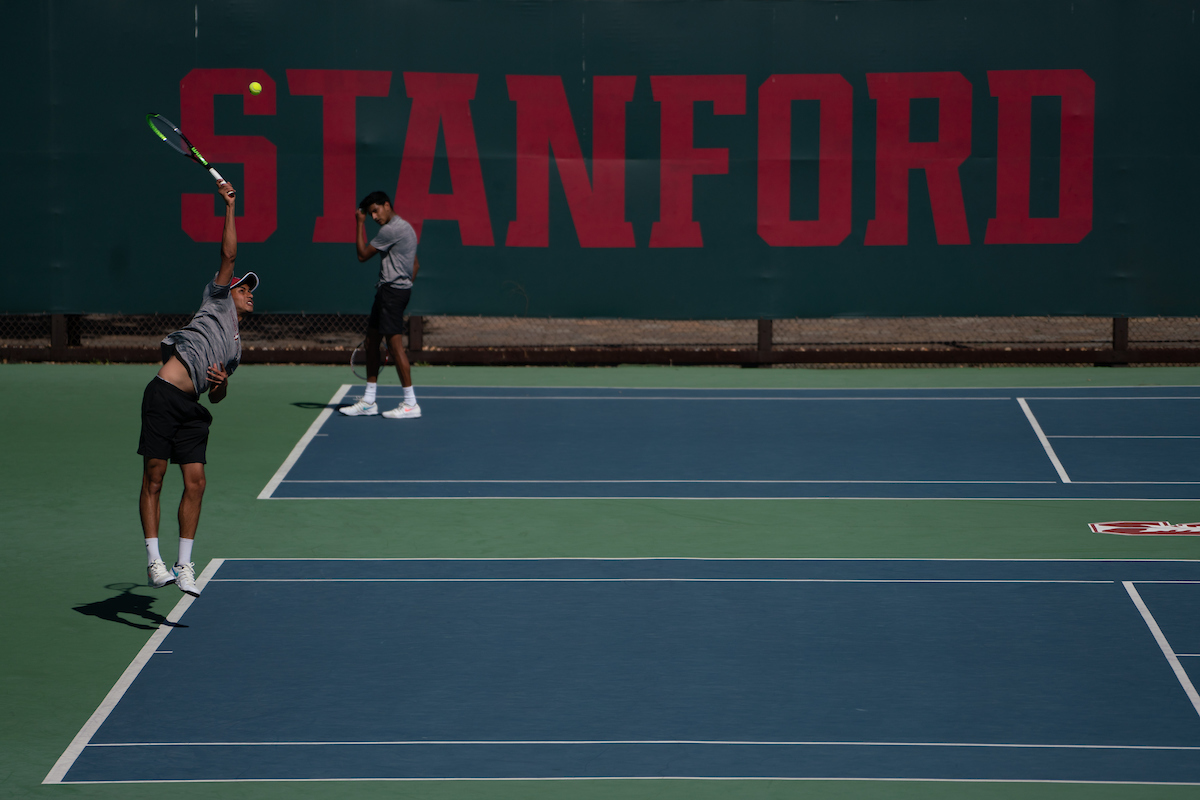Stanford men’s tennis added three stellar freshmen to its roster this year — one of the Cardinal’s strongest recruiting classes yet. Nico Godsick, Kyle Kang and Hudson Rivera kept busy this quarter developing their already-elite tennis games, integrating with their new teammates and adjusting to their new life as student athletes in college.
Prior to committing to Stanford, Kang, Rivera and Godsick were all designated “blue chip” recruits in the U.S. Tennis Recruiting rankings, with Kang ranked No. 1 and Rivera and Godsick No. 12 and No. 20, respectively.
“Nico [Godsick] is one of the more well rounded players we’ve recruited,” said head men’s tennis coach Paul Goldstein. “Kyle [Kang] has just an absolutely world class elite forehand, arguably one of the better forehands that I’ve had the chance to work with in my 10 years [as head coach].”
“Hudson [Rivera] is just really solid with both [backhand and forehand] swings and is an excellent competitor,” Goldstein said.
The players’ descriptions of themselves echoed Goldstein. Godsick characterized himself as “an all-around player“ who is “always looking to finish the net.“ Kang noted the strength of his serve and forehand and his ability to play “aggressive,“ “big-style tennis.” Rivera said his style is to “play big tennis and come forward and serve the first ball and go for my shots.”
Goldstein said he recruited Godsick, Kang and Rivera not only for their world-class tennis abilities, but also for their love of the game, wanting “someone who not only loves tennis but really someone who plays not just to win or not to lose but to figure it out, plays to learn.”
As might be expected, each of the three had their own coaches, a dynamic with which Goldstein is familiar. “In each of those cases we’ve tried to have communication with their coaches from home prior to them getting here,” he said. “[We] maintain that dialogue so that there’s continuity. I think our philosophy … is that there’s no ego here. We just want our players to feel supported and feel like they’re getting the best information possible.”
Now, Goldstein’s goal is to integrate these freshmen into the team, a process that is well underway.
“These three in particular have a really strong connection with one another,” he said. “That bleeds over to the rest of the team and makes that transition, I think, a lot easier.”
“We’ve got really strong leadership on our team this year. And I think with every team … it’s incumbent upon those who have been here in the past to help the first-years get integrated and I think our leaders have done that well,” Goldstein said.
Godsick, Kang and Rivera chose Stanford because of Goldstein, his staff and the rich legacy of the program, and because of Stanford’s academic excellence. However, all three freshmen went to high school online, meaning they have to adjust to both an in-person school setting, as well as balancing rigorous practices.
Rivera acknowledged that there have been some adjustments but he has been navigating any challenges successfully. He stressed the importance of “prioritizing, just knowing what you have and due dates.”
“I just have to be more aware and be diligent in my work. It’s been an adjustment but it has not been too hard,” Rivera said.
Kang praised the role of academic advisors as part of the student athlete support system. “They’ve been really great at helping us manage ourselves and making sure we’re focusing on the right things,” he said.
Godsick echoed his teammates’ sentiments. “Being a college student isn’t easy. I don’t mind that at all. I think it’s actually helping me grow and be able to mature and learn many different skills, whether it’s communication skills, time management, work ethic … and I’m confident that Stanford is the right place for that,” he said.
According to Goldstein, the freshmen are all adjusting well to the new environment. “They are checking all the boxes in a huge, huge way and I’m feeling really positive about that,” he said.
Goldstein recognized that there are important components to his players’ lives beyond tennis. “It’s not only the academic piece to it, but also a social piece and understanding the demands these kids have to have a sort of holistic experience,” he said. “It’s the trifecta for me. It’s tennis, it’s academics and social life.” Goldsick said while all three were important, student atheletes needed to make sacrifices at various points.
In the first week of school, the three freshmen participated in an alumni event, which Goldstein said helped the transition process: “The benefit there is … you get the sense that you’re part of something bigger than yourself.”
According to Goldstein, this feeling is especially significant in tennis “because it is such an individual sport and then for the first time you’re on a team.”
